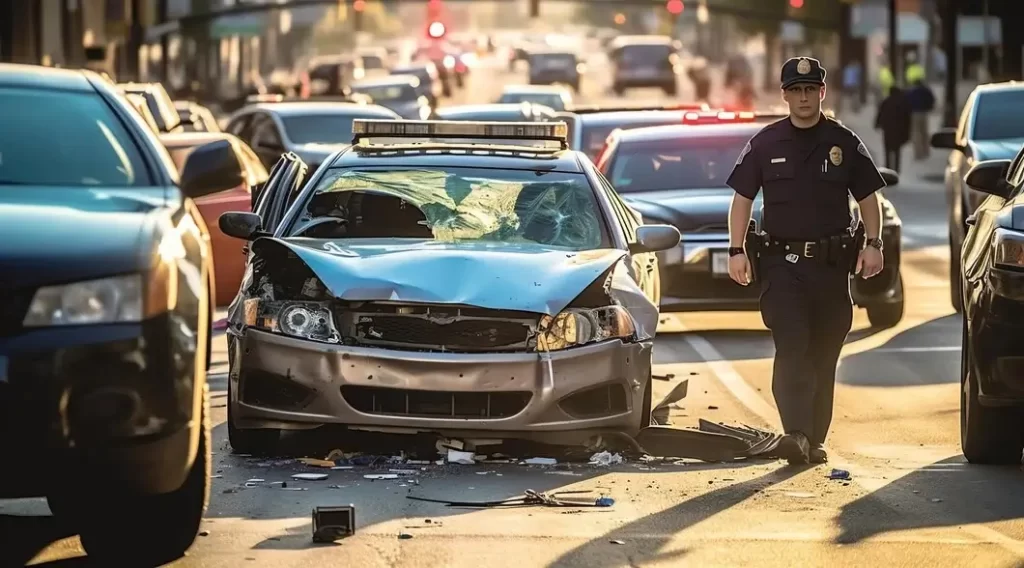personal injury lawyers
Fighting for maximum injury compensation for you and your family
No Fees Until We Win


Leaving The Scene Of An Accident In NJ: A Comprehensive Guide
Accidents are unfortunate events that can happen to anyone on the road.
In the state of New Jersey, leaving the scene of an accident is a serious matter that comes with legal consequences.
This comprehensive guide will delve into the intricacies of this offense, providing valuable insights on how to navigate the aftermath, potential effects on auto insurance rates, steps to resolve a case in New Jersey, and strategies to beat a Leaving the Scene of an Accident ticket.

Does Leaving the Scene of an Accident Affect Auto Insurance Rates?
If you leave the scene of a car accident, it can indeed affect your auto insurance rates. Here’s how:
- Legal Consequences: Leaving an accident scene, especially if someone is hurt or there’s significant property damage, is often illegal. This can lead to fines or even criminal charges.
- Insurance Claims: If you leave an accident scene, it’s harder to prove what happened. This can affect insurance claims. For instance, if an accident occurs on a busy road like Main Street during rush hour, and you leave, it’s tough for your insurance company to understand the situation.
- Insurance Rates: Insurance companies often raise rates for drivers with legal issues, including leaving accident scenes. A study found that drivers with a hit-and-run violation could see their rates increase by an average of 82%.
- Points on License: In many places, leaving an accident scene adds points to your driving record. More points can lead to higher insurance rates.
- Policy Cancellation: In serious cases, your insurance company might even cancel your policy.
Remember, if you’re in an accident on local roads like Elm Street or Oak Avenue, it’s important to stay, exchange information with the other driver, and report the accident.
This helps keep your insurance rates more stable and avoids legal troubles.
How to Resolve a Case in New Jersey
Resolving a legal case in New Jersey can be a straightforward process. Here are the steps:
- Understand Your Case: First, know what your case is about. Is it a small claim, like a dispute with a neighbor, or something bigger, like a traffic violation on Garden State Parkway.
- Seek Legal Advice: It’s wise to talk to a lawyer, especially for complex cases. In New Jersey, lawyers can help explain your rights and the best way to handle your case.
- File a Case: If you need to go to court, you’ll start by filing a case. For example, if you have a traffic issue from driving on the New Jersey Turnpike, you’ll file your case in a local court.
- Gather Evidence: Collect any information that supports your case. This might include photos, documents, or witness statements.
- Attend Court Hearings: You’ll need to go to court on the set dates. It’s important to be on time, dress appropriately, and be ready to present your case.
- Consider Settlements: Many cases in New Jersey are settled outside of court. This means the parties involved agree on a solution without a trial.
- Follow Court Orders: If the court makes a decision, follow it carefully. This might involve paying a fine or following specific instructions.
Failure to Report an Accident
Not reporting a car accident can lead to serious problems. Here’s what you need to know:
Legal Requirement
In many places, it’s a law to report a car accident. This is true especially if there’s injury, death, or significant property damage.
Imagine you’re in a minor crash on a local road like Maple Avenue; you still need to report it.
Insurance Issues
If you don’t report an accident, your insurance might not cover the damages.
Let’s say you bump into another car in a parking lot on Elm Street, not reporting can complicate insurance claims.
Possible Penalties
Not reporting can lead to fines or even legal action against you. For example, in some areas, failing to report an accident involving injury could lead to a fine of up to $500.
Helps in Record Keeping
Reporting helps create an official record. This can be useful later for insurance or legal purposes.
Reporting an accident also means help can come quickly to those who need it.
What Should I Do After an Accident in New Jersey?
If you’re involved in a car accident in New Jersey, here’s what you should do:
- Stop Safely: First, stop your car. If you’re on a busy road like Route 1, move to a safe area if possible.
- Check for Injuries: See if anyone is hurt. Call 911 immediately if there are injuries. In New Jersey, emergency response times are usually quick.
- Call the Police: Even for a minor accident, like a fender bender on Main Street, it’s important to call the police. They’ll create an official accident report.
- Exchange Information: Swap names, addresses, phone numbers, and insurance details with the other driver. Don’t discuss who’s at fault.
- Take Photos: If you can, take pictures of the accident scene, including any damage to vehicles and nearby street signs or landmarks.
- Notify Your Insurance Company: Inform your insurance company about the accident as soon as possible.
- Seek Medical Attention: Sometimes, injuries aren’t obvious right away. It’s wise to see a doctor, especially after accidents on highways like the Garden State Parkway.
- Keep Records: Save all documents related to the accident, including the police report, medical bills, and any communication with insurance companies.
How Do Police Measure Who Departed the Accident Scene?
When an accident happens, sometimes a driver might leave the scene. Here’s how police figure out who it was:
Witness Statements
Police often ask people who saw the accident who left. For example, if there’s a crash on a busy street like Broad Street, nearby shopkeepers or pedestrians might have seen something.
Traffic Cameras
In many areas, like intersections or highways, there are cameras. These can show who left an accident.
For instance, a camera near Market Street could capture a car driving away after a crash.
Vehicle Damage and License Plate
Police look at the cars involved. If one car is gone, they study the damage on the remaining car to get clues.
Witnesses or cameras might catch the license plate of the car that left. This helps police find the driver.
Public Help
Sometimes, police ask the public for information. They might release a description of the missing car or ask people near the accident site, like on State Street, to come forward if they know anything.
What Are the Accident Results in New Jersey?
In New Jersey, understanding car accident trends is important for safety. Here’s what the data shows:
- Annual Accident Rates: New Jersey sees a significant number of accidents each year. For example, in 2021, there were over 270,000 traffic accidents reported in the state.
- Common Causes: Major causes include speeding, distracted driving, and driving under the influence. Roads like the New Jersey Turnpike and Garden State Parkway often see accidents due to high speeds and heavy traffic.
- Injuries and Fatalities: Each year, thousands are injured in New Jersey accidents. In 2021, there were about 61,000 injury-causing accidents and over 500 fatal accidents.
- High-Risk Areas: Urban areas and intersections are high-risk zones. For instance, busy intersections in Newark or Jersey City see more accidents.
- Impact on Traffic: Accidents often lead to traffic jams, especially on highways. A crash on I-95 can cause significant delays.
- Emergency Response: New Jersey has a robust emergency response system, with quick reaction times to accidents.
Consult an accident attorney in New Jersey.
If you find yourself involved in a car accident in New Jersey, it’s advisable to consult with a car accident attorney for sound guidance. Here’s why:
- Understand Your Rights: A lawyer can explain your rights in simple words. For example, if you have an accident on the New Jersey Turnpike, a lawyer can tell you what you can do next.
- Deal with Insurance: Dealing with insurance companies can be tricky. An attorney knows how to talk to them, making sure you’re treated fairly. Legal representation, exemplified by firms like Rosengard Law, significantly enhances the chances of a favorable outcome in court.
- Know the Law: New Jersey’s laws can be complex. A lawyer who knows these laws can guide you through them. This is especially helpful in complicated situations, like a multi-car accident on Route.
- Get Fair Compensation: Lawyers help you get money for repairs, medical bills, and other costs from the accident. They work to get you a fair amount.
- Save Time and Stress: Handling an accident case takes time and can be stressful. A lawyer does the hard work for you, like filling out forms and talking to other people involved.
FAQs
How to Prove a Motorcycle Violation in New Jersey?
To prove a motorcycle violation in New Jersey, the prosecution must provide evidence such as witness statements, police reports, or video footage. Seeking legal counsel can help you challenge the allegations effectively.
How Does a New Jersey Lawsuit Work After an Accident?
After an accident in New Jersey, a lawsuit typically involves filing a complaint, gathering evidence, negotiations, and, if necessary, court proceedings.
Consulting with a personal injury attorney is advisable to navigate the legal complexities effectively.
Conclusion
Leaving the scene of an accident in New Jersey demands careful navigation of legal processes and strategic decision-making.
Seeking professional advice, reporting incidents promptly, and cooperating with law enforcement are crucial elements to reduce the potential consequences of this serious offense.
Responsible driving ensures your safety and protects you from legal and financial repercussions.

Free Injury Case Evaluation
Send the form below and we will call you back in minutes.
…or Call Us Now
856-284-6446
